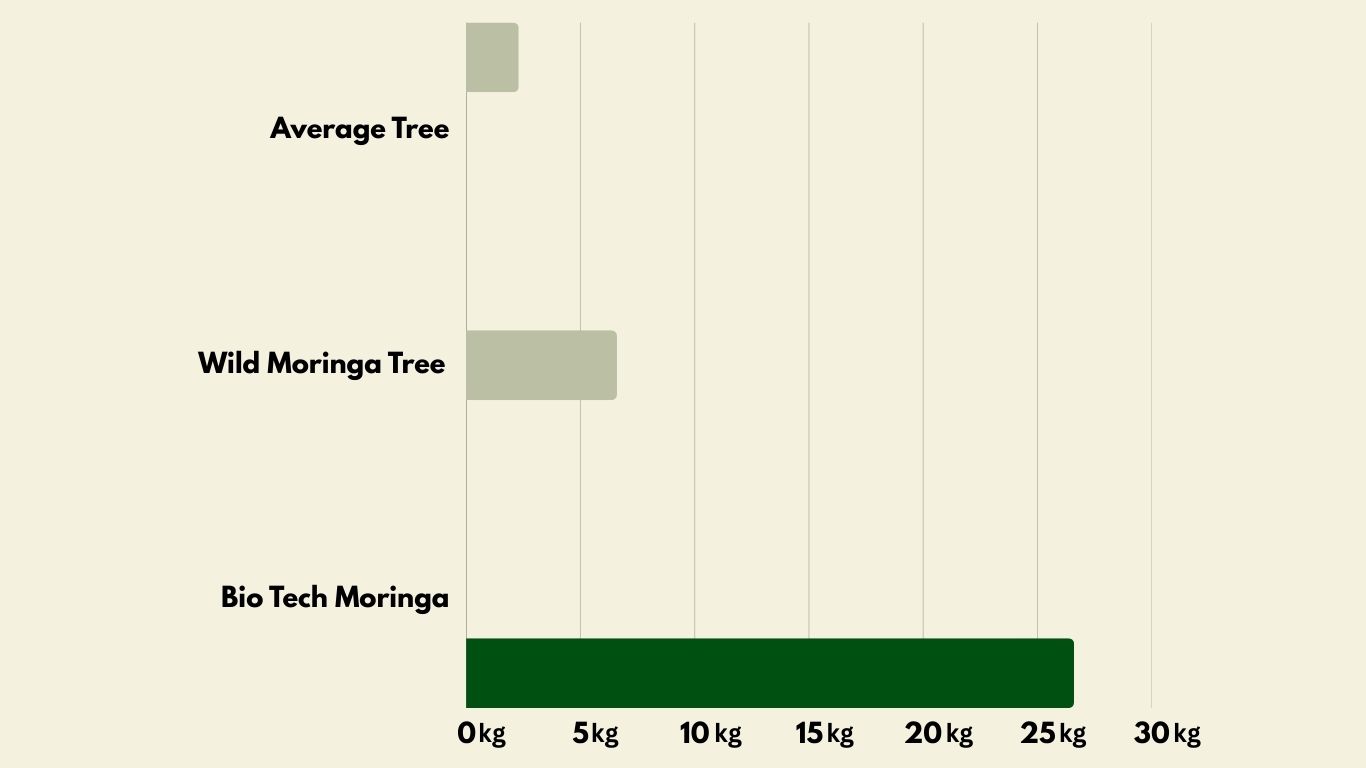MORINGA OLEIFERA TREE
Moringa is a powerful tool in the fight against climate change, absorbing CO₂ at a rate 20 times higher than most plants. Planting 1,000,000 hectares of Moringa trees could sequester up to 5 gigatonnes of CO₂, offering a practical solution to reduce global warming.
Bio Tech has developed a second Moringa tree that produces large quantities of seeds, supporting global planting efforts. These seeds are also used to make Moringa oil, which has health benefits like improving skin, managing cholesterol, controlling blood sugar, and more.
This new variety of Moringa absorbs 6 times more CO₂ than natural Moringa trees and is designed to thrive in hot climates with minimal water. Bio Tech believes this innovation is a major breakthrough in tackling climate change and building a more sustainable future.


THE ADVANTAGES OF MORINGA IN COSMOPOLITAN AREAS
Bio Tech’s Moringa tree is specifically designed to thrive in harsh conditions, absorbing CO₂ at a rate 20 times higher than most vegetation. This initiative isn’t just about planting trees—it’s about fostering a sustainable future, restoring ecosystems, and thus making Bio Tech International Carbon Exchange Limited a global leader in the fight against climate change.
In response, Moringa species have emerged as a critical resource in climate-smart agriculture (CSA), using agroforestry techniques to address these challenges. CSA boosts agricultural productivity, enhances resilience to environmental shocks, and helps reduce greenhouse gas emissions through increased carbon sequestration.
BIO TECH INTERNATIONAL CARBON EXCHANGE LIMITED
REFORESTATION
Reforestation with Moringa trees can improve environmental conditions worldwide. Reforestation involves the natural or intentional restocking of forests and woodlands that have been depleted, often through deforestation. This process improves human life by absorbing pollution and dust from the air, rebuilding habitats and ecosystems, mitigating global warming through the sequestration of atmospheric carbon dioxide, and providing renewable resources such as timber.
ALLEY CROPPING
Alley cropping involves planting single or multiple rows of trees into fields of crops or forage. The tree rows create protected alleys for agricultural or horticultural crops. This method offers numerous benefits, including diversifying farm products, supplementing income, reducing soil erosion caused by wind and water, and improving soil quality. Moringa trees can be effectively used as alley crops in agricultural fields across Saudi Arabia.
EROSION CONTROL, BOUNDARY, BARRIER, AND SUPPORT
Moringa plants are well-suited for controlling soil erosion in areas affected by strong winds and prolonged dry spells. They can be planted as hedgerows to provide wind protection, reduce sandstorms, serve as barriers for agricultural crops, and offer shade and support for climbing plants. Moringa is also widely planted as an ornamental species in many countries. Intercropping with Moringa can provide semi-shade in areas where intense sunlight could damage crops. Furthermore, the cultivation of Moringa can create employment opportunities, including raising seedlings, tissue culture plantlets, planting, cultivation, harvesting, processing, and industrial applications.
MORINGA CARBON ABSORPTION
Moringa is incredibly efficient at absorbing CO₂: While it takes 23 Japanese cedar trees 50 years to offset the annual CO₂ emissions of one person, just two Moringa trees can do this in only two years. To offset the CO₂ emissions from a family car, it would take 160 cedar trees 50 years, while 10 Moringa trees can achieve this in two years.
Bio Tech Moringa trees take this efficiency even further, absorbing CO₂ at 6 times the rate of wild Moringa trees. In just four months, one Bio Tech Moringa tree can offset the CO₂ emissions of one person for an entire year, and in just six months, it can offset the emissions from a family car.
This makes Bio Tech Moringa the most efficient natural CO₂ absorbent tree, capable of transforming urban areas by reducing CO₂ levels, filtering pollutants, and improving air quality. For example, in a city of 5 million people producing 98.8 million kilograms of CO₂ each month, 5.5 million Bio Tech Moringa trees could absorb 107.8 million kilograms of CO₂ monthly, creating a CO₂-neutral city.
Scaling this process globally would have a huge impact on mitigating climate change. Moringa’s resilience and incredible carbon absorption rate make it a sustainable solution to reduce greenhouse gases, combat pollution, and restore environmental balance.
CO2 ABSORPTION PER MONTH

